Posts by Jesse Liu
5 Reasons Why Product Assembly in China is Key to Business Success
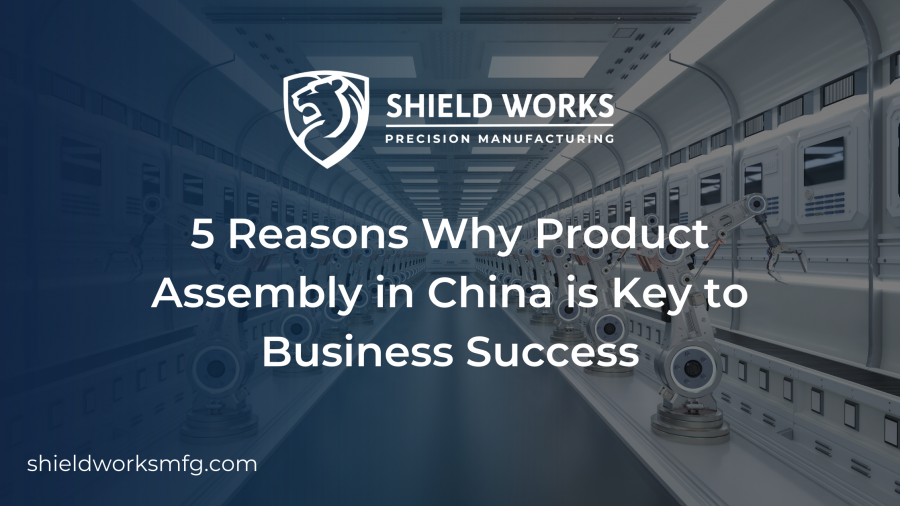
You may have heard the term product assembly in China before, but you might not be entirely sure what that means or how it will affect your business. Many companies decide to outsource this process to help them keep costs down and get their products in front of more customers. In order to decide whether or not product assembly in China could play a key role in your business success, you need to learn more about what it entails and how it works.
1) Suppliers are available around the clock
In China, suppliers are available around the clock, which means that you can get your products assembled and shipped out much faster than if you were doing it on your own. This can be a major advantage for businesses that need to move product quickly.
You have more control over the quality of the product. When you have your products assembled in China, you have more control over the quality of the product. This is because it is also much more affordable there to hire 3rd-party QC service to inspect the products before they are shipped out, and you can also choose to have them assembled by a reputable company that usually comes with an excellent QC team.
If you have your products assembled in China, you can save money big-time on shipping costs, given all the transportation access China offers.
2) The ability to experiment with new ideas
When it comes to business, the ability to experiment with new ideas is key to success. And what better place to do that than in China, where there are endless opportunities for product assembly? You’ll be amazed at the expansive network of suppliers and manufacturers you can choose from.
In addition to a wide variety of options, you’ll also have access to manufacturing facilities at an affordable price. If you are just starting out, it’ll be very cost-effect for you in terms of trying out new ideas and finetuning your product. There’s no need to worry about breaking the bank before your product has even been released into the market!
3) Variety of product expertise
Decades into being the “World’s Factory”, Chinese manufacturers have developed strong versatility for types of products they can assemble. The wide range of industries that use product assembly services makes it possible for companies to outsource many aspects of their production process to China and still maintain control over every step, from design and development, through manufacturing, quality assurance, distribution and after-sales service.
Spanning from textile to advanced electronics, you will have no problem finding a supplier for any part of your product locally. Your company does not need to dedicate all its resources towards producing one specific type of product as it can easily find suppliers who are experts in different parts of the production process. These specialists work hand-in-hand with other local factories so that you do not need to allocate staff or space at your office solely for these processes.
4) Utilization of the latest technology
In order to stay competitive, businesses need to utilize the latest technology. This is especially true when it comes to product assembly. By using state-of-the-art machines and equipment, businesses can ensure that their products are of the highest quality. Additionally, by keeping up with the latest technology, businesses can save money on production costs.
China is definitely you to-go option regarding technology, especially If you’re looking for top-of-the-line machinery. Due to encouragement from the government and decades of industrialization, China has managed to stay on top of the game as far as new innovations go. It’s not uncommon for a company in China to have access to many different types of cutting-edge technology which they can use at an affordable price. The accessibility of these technologies gives Chinese manufacturers a competitive edge over others because they are able to produce higher quality goods more quickly than ever before.
5) Speed of production
In today’s business world, time is money. And when it comes to product assembly, China has the speed advantage. With a well-oiled assembly line and a large workforce, China can get your products assembled and shipped out faster than most other countries. That means you can get your products to market quicker and start generating revenue sooner. It also leaves room for contingencies if there are delays in shipping or if another one of your suppliers cannot deliver on time.
Also, your company will grow because your company was able to do what others couldn’t. Your company is flexible: You may need more help assembling at certain times but not at others. For example, during western holidays or long weekends where many companies would like extra help with their orders. If you were already doing some assembly in China, this would allow your assembly team in China to be ready for those busy periods without having to find new hires and train them up from scratch – something which takes up both time and money before they’re productive again.
Meanwhile, your time saved on product assembly can be well spent on marketing. Multi-tasking is very much viable for your business!
By working with a reputable assembly partner in China, you can ensure that your products are of the highest quality and meet all applicable safety and quality standards. Shield Works has over 17 years of experience under the belt to help you achieve all of that. It’s never too late to take action. Contact us now!
How Partnering with a China Manufacturing Company Can Benefit Your Product Design And Development
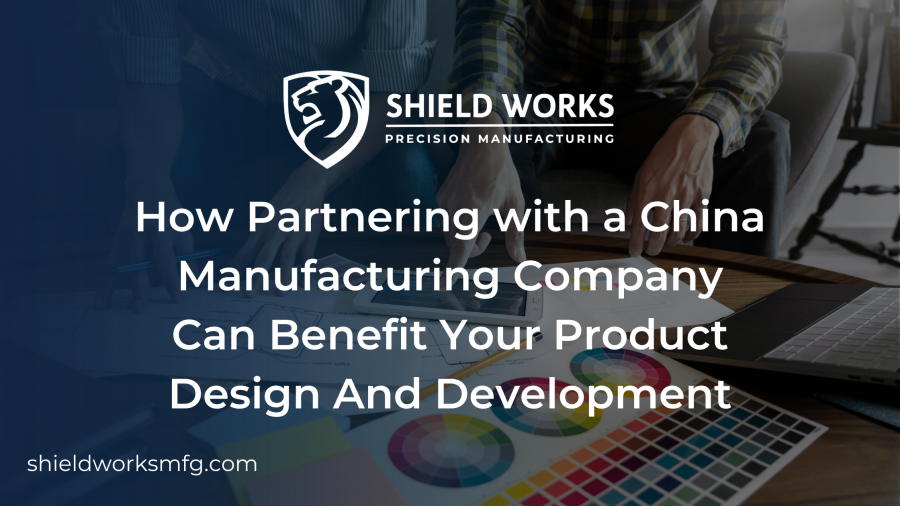
Are you an entrepreneur who’s looking to partner with a China manufacturing company in order to bring your product design and development process to the next level? If so, there are several reasons why partnering with China’s manufacturing industry can be extremely beneficial to your goals as an entrepreneur. Read on to learn how it can benefit you, as well as some tips on how to go about it if you’re interested in pursuing this option.
Shorten time-to-market
One of the main benefits to outsourcing product design and development to China is that you’ll be able to shave time off your schedule. There are many facets of every project that can be outsourced, including: design, prototyping and 3D modelling, etc.
Designing and developing products takes time, but if you choose to partner with a manufacturer in China, you’ll be able to reduce that time significantly. There are many aspects of your product that can be outsourced, including: design work, prototyping, 3D modelling and more. Working with outsourcing partners means not only being able to work faster (by hiring those who have experience), but also saving money by splitting up the workload between parties. If you choose to go through an entire project (or any part) on your own though, don’t expect costs to stay low. After all, time is money.
Keep up with demand
With Chinese manufacturers, you’ll get instant access to an enormous, world-class supply chain. Instead of producing small batches of products for an uncertain audience, you can create a minimum order quantity (MOQ) large enough to keep up with demand at any given time. A foreign production partner that handles warehousing, shipping and logistics means you won’t have to worry about overseas shipping and import/export documentation; it all gets taken care of automatically by these suppliers.
With so many Chinese manufacturers online today, finding one that meets all of your specific needs is easier than ever before. All you need to do is type in what you want into a search engine or go through Alibaba’s list of vendors. From there, you can select potential partners based on their location, reputation and other factors(Shield Work will be your ideal option!). Once you’ve found a few options that seem like good fits, contact them directly to learn more about their capabilities and ask questions. The key here is to be proactive: don’t wait until after your first shipment arrives—or even worse—after your first customer complaint!
Improve Quality Control
Letting manufacturers in China handle all aspects of production frees up resources to concentrate on quality control. With Chinese manufacturers, you have instant access to hundreds or thousands of factory workers. This means you can scale production quickly as needed. It also helps ensure that every unit produced is identical; from batch to batch, every piece is exactly how it’s supposed to be. When you produce small batches by hand in-house, inconsistencies are inevitable and quality control becomes very difficult. And there’s no way around it—anyone who produces products for resale has to control quality when producing on such a large scale.
With a wide selection of factories at your disposal, it’s simple to move orders between suppliers if one is having issues or just wants to temporarily take on less work. If there are problems with quality control, you have options. And if you don’t have a problem but another factory does, you can easily switch things up without wasting too much time or money. As long as you have good relationships in place, production companies will be willing to accommodate your needs. This saves time and ensures that every unit produced meets your standards—and gets shipped out quickly so that customers receive their products as soon as possible.
Cut Costs
Product design and development costs in China are notoriously low compared to Western countries. There’s plenty of reason for that, including a large talent pool at competitive prices, very inexpensive electronics components, taxes that aren’t levied on imported goods, and no trade tariffs on exported products. Moreover, there’s an enormous variety of suppliers to choose from — more than any other region in the world due to their full-fledged supply chains — so you have more control over specific aspects of your product. For example, assembling devices could be done at one facility while circuits are designed elsewhere. Finally, when it comes to producing prototypes or small runs before going into full production—or even if you just want to validate ideas quickly—prototyping is generally faster in China than anywhere else.
Use New Technology
One of the biggest things that distinguishes Chinese manufacturing is its tech boom over the past decade. This has greatly equipped its manufacturing ecosystem, particularly in areas like product design, where technology has become an integral part of the final product. As such, when it comes to product design and development in China, many foreign businesses have begun to take advantage of new technologies—3D printing being one prime example—to speed up their processes. With these new technologies, foreign companies are able to make prototypes faster than ever before and create higher-quality products than they could otherwise.
Another big difference between Western manufacturers and those in China is how modern factories use data to improve productivity. In China, every aspect of production is tracked digitally, which means workers know exactly what’s happening at any given time during production. This means there are fewer errors—and more importantly, faster turnarounds—than you would find in other countries.
The list of benefits of using China manufacturing to design and develop your next product can go on forever. If you haven’t yet manufactured in China, you need to weigh out all options before making a final decision. It isn’t as cheap as it used to be, but with manufacturers’ experience and current technology, it’s definitely very cost-effective and saves you from a bunch of headaches. Shield Works is one that can take care of all you need for your product with over 17 years of experience and excellent in-house team. Contact us if you’d like to know more!
Top 5 Tips of Ensuring Smooth Communication with Your Chinese Manufacturer
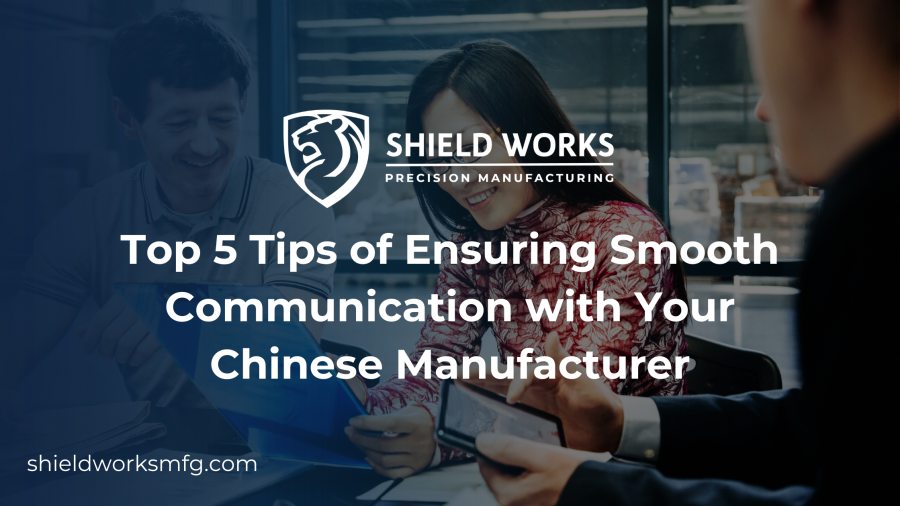
It’s easier than ever to get your products manufactured in China, with resources such as Alibaba, Quora, and Google Translate at your disposal. But having a reliable Chinese manufacturer isn’t just about knowing how to communicate with them; it’s also about understanding how the whole process works and what your role is in it. Here are the top five tips for ensuring smooth communication with your Chinese manufacturer to help you get started.
1) Have a clear idea of what you want
Before you go contacting manufacturers in China, spend some time to really figure out what it is that you want. Don’t just say I want a cheap product made in China. Get specific. Look at different products that are similar to yours and decide exactly how your product will differ. And if there are aspects of your product that can be improved upon, do it! It’s always a good idea to outdo your competition. The more detail you put into your product from start to finish, the better off you’ll be when it comes time to communicate with your manufacturer.
Find a model or sample if you can for reference. A picture is worth a thousand words, and seeing exactly what you want will help your manufacturer understand exactly what it is that you’re looking for. They may even be able to point out design flaws in your product that you hadn’t considered before! It may seem like an extra step, but it could save time and money in the long run.
If your product requires any specialized parts, make sure to get those details sorted out early on as well. If there are specific types of wood that need to be used or special kinds of metal, make sure to clarify that from day one so there aren’t any problems later on down the line when it comes time to actually produce your product.
2) Be clear on expectation and deadlines
If you’re planning to work with a Chinese manufacturer, make sure your requests are as clear and specific as possible. Make deadlines clear and enforceable, otherwise there is no incentive for your team to stick to them. If a situation arises that requires changes or exceptions, have a separate process in place (such as checklists) to make sure everyone on both sides knows what’s going on. Good communication saves time and money—two things every business wants more of.
That’s why it’s advisable to find a manufacturer with their own production facility, preferably in the same city or anywhere within three-hour drive. This way you can easily check on your products and make sure everything is going according to plan. It also means that you don’t have to worry about shipping costs and delays from faraway locations. Finally, if something goes wrong, you’ll be able to respond quickly—and save face by fixing things before they get out of hand.
3) Know how the factory and its QC operates
We can’t emphasize enough how important it is to build an in-depth understanding of how your factory runs and what your QC protocols are. A deep understanding will help prevent issues, save you time and money, as well as help you work more effectively throughout your manufacturing process. There’re so many independent vetting services in China you can turn to. You’ll find them on Alibaba or by Googling independent QA checker or independent quality control checker. You’ll also want to make sure you understand exactly who your QC inspector is and that they have a good track record of working with other western companies. If you don’t know who they are, ask! Ask to speak directly with them or their supervisor if possible. It’s better to be safe than sorry when it comes to communication breakdowns between yourself and your manufacturer!
Although there’re many independent QC services with a history of working with western firms, if you insist on one that shares a similar cultural background with you, Shield Works has its root in the UK with years of QC experience in the industry that you can fully rely on.
4) Get someone local in China that you can talk to
Even if you don’t speak Mandarin, there are still ways to ensure you get your message across. If you’re traveling to China yourself, a translator is a must-have. But given the current travel restrictions, it is not an option to physically be there. So what do you do? You can hire someone local in China that can act as a liaison between you and your manufacturer. They should have experience working with Westerners and can translate information from both sides of communication (i.e., from English to Mandarin and vice versa). They will help bridge any language barriers that may exist and make sure everyone is on the same page regarding deadlines, expectations, etc. This will help reduce confusion and miscommunication that could lead to delays or other issues down the road.
But most manufacturers there now have bilingual team members that have no problem communicating with you in your language. if you manage to find one with a western background like Shield Works, that’ll save you a lot of efforts!
5) Keep your language plain and simple
This may seem obvious, but be sure to speak clearly and concisely. If there’s anything you don’t understand about what you need to accomplish or convey, don’t guess or fill in gaps with assumptions. If a word confuses you, go back and get clarification. Try to avoid using big words as it can make it harder to understand for non-native speaks. Keep your language simple
Remember that your goal is communication—not simply understanding what someone is saying to you. Successful communication requires that both parties feel confident they have a full understanding of one another’s intentions before moving forward on any project or task. Otherwise, confusion will quickly ensue; misunderstandings can lead to delays and even make-or-break moments down the road. The more time you spend ensuring that everyone understands each other, the less time it takes to complete tasks. A little upfront work now can save a lot of headaches later.
By following these five tips, you’ll be on your way to having a smooth process of communication with your manufacturer and start working together to create a great product. Shield Works is one that comes with their own manufacturing facility located exactly where the headquarter is, and bilingual team members as long as 17 years of manufacturing in China under their belt. Contact us today!
Why Product Design and Development in China is Worth A Second Look
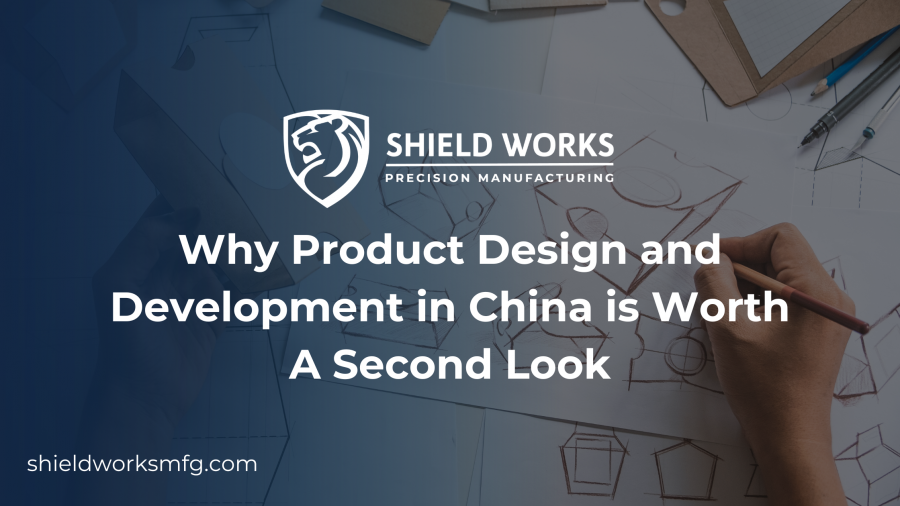
Chinese manufacturing has long been infamous as the place where you can get cheap, but low-quality, goods. But times are changing, and China can now claim to be the home of some of the highest quality products available in the world. Product design and development in China has been improving significantly over the past several years, and many companies are looking towards China to get great products manufactured at affordable prices. Here’s why product design and development in China may be right for your business as well.
The rise of Made-in-China
If you’ve spent any time shopping for consumer goods, there’s no doubt that Made-in-China products are everywhere. While some manufacturers simply relocate to take advantage of low labor costs, others—including those with a luxury brand—choose to make high-end goods on Chinese soil to keep an eye on quality control. Meanwhile, more Chinese companies are starting to build their own brands by marketing their home-grown products as superior (whether they actually are or not). An interesting phenomenon of modern consumerism; plus, it’s hard to argue with cheap prices.
Products made in mainland China, with their high production quality and low prices, are starting to become popular, even not just in China. Its strong presence in international markets, especially in the area of electronics and new energy vehicles, has proved the point. Chinese products have gradually formed an image that is both attractive and reliable. The country’s brand awareness among global consumers will continue to rise along with its economic growth, making it more important than ever for foreign companies to consider how they approach manufacturing there, especially in terms of designing and developing their product there, as China is very capable now in this regard and China-made products are less and less associated with negative stereotypes.
Technology Innovation
China never shies away from its ambition in technology innovation. Take Shenzhen for example, a Chinese city adjacent to Hong Kong, which has risen quickly as one of Asia’s fastest-growing tech hubs. And it’s only going to get bigger: Shenzhen will invest more than 700 billion RMB($104.05 Billion) in hi-tech research and development as its 14th five-year plan. In addition to software startups, electronics manufacturing plays a large role in its economic growth; there are over 100 companies within Shenzhen dedicated to producing electronic products for other companies.
It’s no wonder that Silicon Valley giants like Intel have turned their attention (and investments) toward Shenzhen—the global market for smartphones alone will reach nearly $792.51 billion by 2029. By comparison, total U.S. retail sales were $6.6 trillion in 2021. The future looks bright for Shenzhen, and even Apple has started to outsource more and more assignments to Chinese engineering and design teams. Its technology capabilities of developing a product has made working with manufacturers in China an excellent way to get your products designed and produced quickly and creatively, and some of their technologies even have redefined the whole industry.
It may not be dirt cheap anymore, but still cheaper than your native market
China may not beat Southeast Asia regarding price, but it definitely only costs a fraction of what will cost if designing and developing your product in a western country. Moreover, Chinese companies are generally more willing to work with you to help you come up with an idea that can be produced at an affordable price than those in other countries. This means that you could end up saving money by going through them as they might suggest ways for you to lower production costs without sacrificing quality. It’s also worth noting that because Chinese workers are paid more moderately – so don’t be afraid to ask for multiple revisions on your prototype until it’s just right!
You’ll also have access to a huge pool of affordable talents. The sheer number of universities (both public and private) located throughout the country mean that there are thousands upon thousands of people who have already graduated with degrees related to these fields. In fact, many would argue that China has some of best colleges around – many even rank among top universities worldwide – which means there’s no shortage when it comes to getting qualified candidates for your project! Most importantly, that’ll cost a lot less than the west.
Full-fledged Supply Chains
If you want to start an actual business, not just launch an idea or a project, then you need to make sure that your idea can become reality. That involves making sure that all aspects of production are accounted for and worked out so there aren’t any nasty surprises down the road. This is called having a full-fledged supply chain, and China has it. China allows companies to take advantage of its large manufacturing base without sacrificing quality control, and every aspect of a manufacturing process is concentrate around one place, which will afford you better control.
It also makes it easier for small businesses to get started since they don’t have to worry about building up a massive infrastructure from scratch. Getting started with product design and development in China means taking advantage of these benefits—and potentially saving yourself time and money along the way.
In short, there are many benefits to getting your new product design and developed in China. If you have a clear idea of what you want from your manufacturing partner, it doesn’t take long to find one that suits your needs perfectly. Shield Works is your perfect choice with 17 years of product design and development helping so many startups. Let us know if you’re interested!
5 Tips For Reducing Costs On Quality Control In China
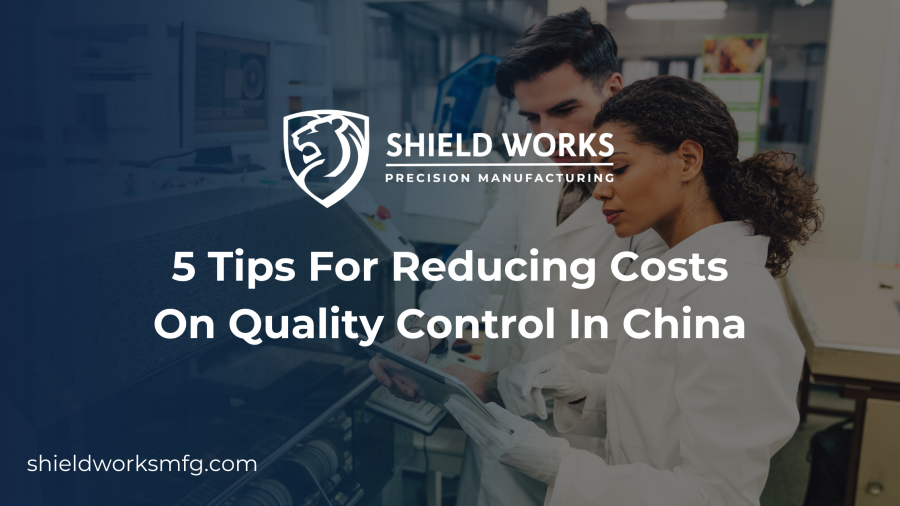
Whenever you’re sourcing products in China, it’s always a good idea to have quality control measures in place. These will ensure that your products are as strong and durable as they need to be, so that customers continue to buy them and recommend them to their friends and family members. However, it can often be difficult to save money on quality control when working with Chinese suppliers. Here are five tips for reducing costs on quality control in China.
1) Use 3rd-Party Inspection Services
Third-party inspection services will typically charge a fee for their services but will also help streamline communication between your factory and yourself. They’ll also help prevent any language barriers from interfering with communication. A third-party inspector will typically visit your production facility once per month during production runs, which means you’ll still need to conduct regular inspections via Skype or other methods yourself throughout each month. But by using third-party inspectors regularly throughout production cycles, you can ensure that problems don’t go unnoticed until after goods have been shipped off to customers. When it comes to quality control in China, a little bit of extra effort now could save you thousands of dollars later on.
2) Build Relationships With Suppliers
Your China manufacturing operation is only as good as your supplier relationships. That’s a fact. When suppliers deliver on time, meet quality requirements and are flexible when you need them to be, then you can feel confident in putting your product in front of consumers. But if a supplier flubs an order (or multiple orders), doesn’t pay attention to details or otherwise cuts corners that affects quality, it will be reflected in customer perception of your brand—and eventually sales results. Unfortunately, there’s no simple solution here because every situation is different, but there are ways to help minimize risk of problems with suppliers and still find high-quality products at a price point that makes sense for your business. Having a solid relationship with your China manufacturer will help ensure all goes well from start to finish so as to save for quality control later.
3) Find Suppliers You Can Talk To
As we just mentioned, it’s crucial to build a good relationship with your suppliers. If you have a supplier that will work closely with you, you will have peace of mind knowing that your products are being built as per your specifications and on time. This can save you thousands of dollars in unnecessary costs on quality control inspection and rework if your supplier is lax about following instructions. Since many China manufacturers don’t speak English well, try to find someone who can understand what you need or use an agency or translator who specializes in working with Chinese manufacturers. Also make sure to check references before doing business with any new supplier.
4) Get Critical Feedback While Your Product Is Being Manufactured
One of the biggest mistakes entrepreneurs make when manufacturing a product is assuming that everyone is as invested in its success as they are. But often you’ll be working with multiple vendors, each responsible for a different component of your finished product. Without directly collaborating with all vendors, it can be hard to spot inconsistencies—like inferior fabric or mismatched parts—until too late in production. The easiest way to catch these and other problems early on is by getting critical feedback from suppliers and manufacturers while your product is being made. While it’s impossible to ensure perfection, taking advantage of communication can help limit any mishaps during production so they don’t cost you time or money later down the line.
5) Get Involved in the Production Process
When you’re manufacturing overseas, quality control is a crucial issue. If there are quality issues with your product or manufacturing process, that means you will lose time, money and a lot of reputation. The best way to overcome quality problems is to get involved in QC yourself. A first step would be to try testing out parts of your production process at each stage before you send it off for mass production. This will make sure that whatever defects happen are caught early on and can be corrected as early as possible, with minimal cost and effort. With current travel restrictions, most likely you won’t be physically there in China. Make sure to find one that can livestream the whole process or any trusted 3rd-party inspection services to test it out for you.
Overall, quality control is one of those things that may seem small in terms of overall costs and time, but it can make a significant difference to your bottom line in both ways. It’s never too early or too late to start improving your QC. Shield Works has over 17 years of QC experience with our own professional team, contact us if you are in need of QC service in China!
3PL Service Can Help Boost Your Amazon Business
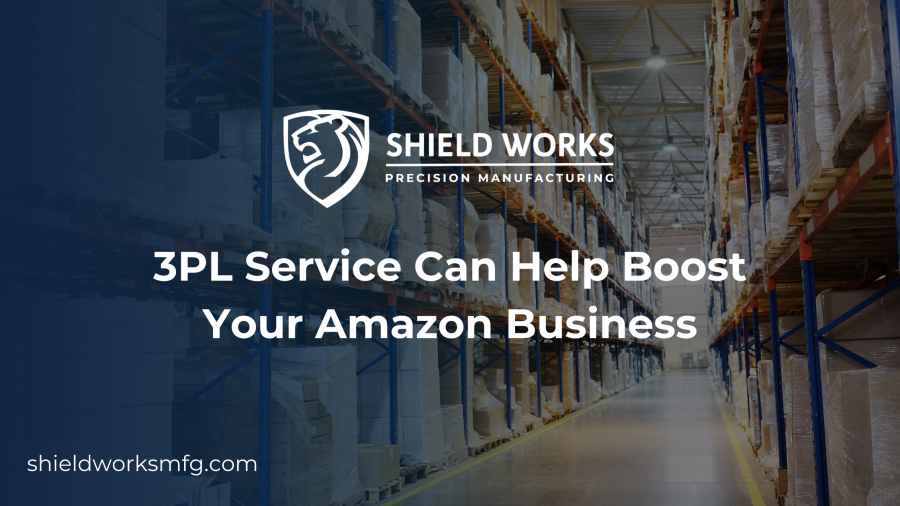
3PL service can be a valuable tool to help your Amazon business grow and get where you want it to be. But why use 3PL service? What are the benefits of working with 3PLs? How can they help with your Amazon business? Those are all excellent questions, so let’s take some time to go over them in detail.
What is a 3PL Service?
You may be familiar with 3PL services already. A third-party logistics (3PL) company is a business or other entity that handles storage, transportation, sorting and delivery of goods on behalf of a retailer. The U.S. has more than 6,000 3PLs, according to American Association of Port Authorities (AAPA). Amazon itself is often cited as one example of a company that uses 3PL service for its ecommerce sales via Fulfillment by Amazon (FBA). In fact, many online retailers use 3PL services because they’re so convenient: They can offload some or all shipping responsibilities from their own staffs to experienced professionals who have access to resources like trucks, warehouses and sophisticated software. That leaves your small business free to focus on what it does best—selling products—while you outsource what you don’t need in order to grow faster.
With more and more businesses outsourcing their manufacturing overseas, 3PL service in other countries are also in high demand, especially in China. These companies can help your business save money by providing a single point of contact for all your global logistics needs. Many of these firms have experience dealing with multiple languages and cultures, so they can communicate directly with suppliers in foreign countries to ensure that your products arrive on time and as expected. This is particularly helpful if you’re new to importing or exporting goods from overseas: You can leave most of the work to them while you focus on growing your company’s sales revenue.
Why Do I Need it as an Amazon Seller?
More importantly, what are your options for managing third-party fulfillment? One option is to do it all in-house, but that can be difficult if you’re trying to run a business. In addition, it might make more sense from a brand management perspective to use outside vendors with established reputations. For example, Shield Works offers 3PL (third-party logistics) services that allow Amazon sellers to leverage its warehousing infrastructure and expertise on their behalf. This allows Amazon sellers like you to focus on brand development instead of worrying about operational details.
What’s more, it provides peace of mind by helping ensure inventory doesn’t sit idle or get lost. There are many ways to approach your online sales efforts—and no one way is better than another—but shipping and fulfillment may be one area where working with an expert makes sense.
What Should You Look For In A 3PL Service Provider?
The following are some things you should consider when evaluating a 3PL service:
Global reach
Choose a provider with locations around the world so you can reach customers in multiple time zones. Comprehensive set of transportation options. You’ll want access to air, ocean, trucking and rail services so you can choose whichever mode is most cost-effective for each shipment.
Transparent rates and fees
Look for providers that charge per package or weight based on total volume rather than as a percentage of total value. This will allow you to price your products competitively without surprises at checkout from additional fees. Recurring transport scheduling/management capabilities.
Real-Time Tracking
Want to know where your shipments are at all times? 3PLs that offer real-time tracking can help ensure you’re meeting customer service standards. Check out the system they use and do some research on how it works and it’ll give you an idea how your goods will be handled.
Automated import/export services
For example, if you need assistance calculating how much duty you will owe on a shipment to Europe, a provider with an automated system can save you valuable time and eliminate errors.
Customized shipping solutions
A provider that offers these services will help you ship products directly from China or other overseas locations to your customers in North America and Europe at competitive rates. This is particularly helpful when importing large volumes of goods from China as it allows you to take advantage of bulk discounts on shipping charges by consolidating multiple packages into one larger shipment that arrives at its destination faster than individual shipments would have arrived.
Multiple package-shipping options (e.g., small, medium or large boxes).
A 3PL service provider should offer multiple box sizes so that you can choose which size best fits your product’s needs and reduce packaging costs accordingly.
Questions to Ask Before Hiring A 3PL Logistics Company
Choosing a 3PL service to transport your inventory can seem daunting. The Amazon marketplace is full of shipping companies claiming to offer inexpensive, efficient and reliable shipping services for sellers. As with any decision you make regarding your business, it’s important to take time before selecting a company that will handle your shipments. If you’re thinking about hiring a 3PL logistics company, ask yourself these questions first:
- How do they communicate?
- Is their response time reasonable?
- Does anyone actually pick up their phone when you call?
- What is their process for handling shipments?
- How can I access information about my shipment?
- How are customs forms handled?
- What happens if my shipment gets seized by customs or delayed by weather or other factors outside of my shipper’s control?
As we wrap up, there are two things you should remember: first, 3PL’s can be a great asset to your Amazon business. By working with a reliable and trustworthy service provider, you can save time and resources on everything from picking and packaging to shipping and order fulfillment. The second thing is just as important: choose a provider that meets all of your specific needs. The best 3PL will have industry expertise (especially in terms of handling products), but will also make it easy for you to monitor shipments and control inventory without missing out on profit potential. Whether you’re just starting out or expanding an existing operation, pay attention to each of these tips when selecting a new supplier partner!
Shield Works is one of your ideal options with our western background and 17-year industry experience. We have helped so many launch their Amazon business with our logistics service in both the US and China. Reach out to us and learn more about how we can help!
Reliable 3rd-Party Quality Control Services in China: Tips to Find Them
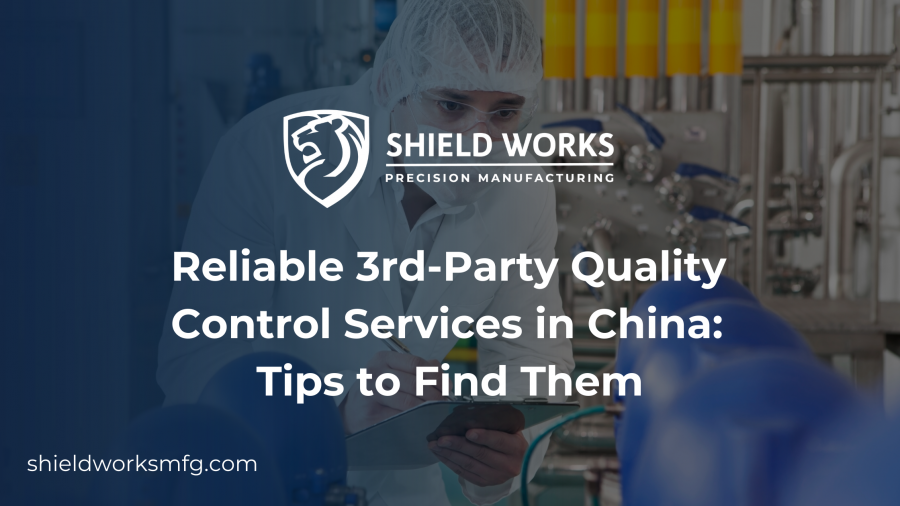
When you’re importing goods from China, the last thing you want to do is get things wrong on your end. That’s why you need to hire a 3rd-party quality control service to check the product before it gets shipped out to your customers. The problem, however, is that there are so many companies offering this type of service in China that it can be hard to know which one will do the best job at an affordable price. By following these tips, you can find exactly what you need from an excellent 3rd-party quality control service in China and avoid costly mistakes with your business.
What is 3rd-party quality control service?
A 3rd-party QC inspection is a kind of quality control conducted by an independent and neutral institution. A company can choose a 3rd-party inspection agency as its partner for QC at a lower cost, because it’s outsourced from them. In comparison with other types of inspections, such as 2nd party or 1st party inspection, 3rd party QC is recommended more. Mainly because it’s less expensive than other two types but still has strong credibility among customers. The key reason why companies prefer using a 3rd-party QC service provider is that they don’t have to buy any equipment or hire new staff members. Instead, they can just focus on their core business while outsourcing their quality control services.
Can I trust 3rd-party quality control service in China?
This is probably one of the first questions that comes to mind for many people considering outsourcing their quality control needs in China. It’s natural to have doubts about something you are not familiar with, but rest assured that you can trust Chinese quality control services. Hiring a 3rd-party in China is no stranger to many businesses. In fact, it’s common practice for large foreign companies to hire several 3rd party QC services in China, such as SGS and BV. These companies are large and well known due to their reputation of accuracy, strictness and integrity. Thus, if you already outsourced your QC work to them before, you would most likely find their service worth returning for another round of cooperation.
What should you first consider when choosing one?
If you are new to China, choosing a quality control company in China can be challenging. There are so many independent QC services for you to choose from in China. It is also hard to tell if a 3rd-party QC provider is good or bad as there are no clear standards or service levels available. You need to make sure that they can provide quality inspection service at an economical price that suits your budget while also ensuring quality. To find a reliable 3rd-party quality control company in China, it’s important to understand what type of product testing and inspection needs you have first. For example, do you require plastic injection molding samples inspection? What about raw material inspection? How will these materials affect product performance? What kind of production process is used? Are raw materials tested prior to production? These questions should help narrow down your search and help you find a trusted and qualified 3rd party inspector who will do their job well.
How can you judge whether they are qualified or not?
First, it’s a good idea to ask for samples of their previous work, as well as references from existing clients. Once you have selected a few prospects, there are also several ways you can get an idea of their competence and reliability. Before selecting any one provider for your project, make sure that they have experience working with similar projects. Check if they have received ISO certification and how long they have held it for. Also ask what kind of equipment they use on site and how large their staff is; an operator should be on site at all times during testing. If possible, find out if they have ever done business with other companies in your industry. This will help you determine whether or not they will understand your needs and requirements. Asking these questions up front will save you time and money later on down the line when things go wrong. If possible, request a copy of their quality control manual so that you know exactly what to expect from them before signing anything official.
Where to find reliable 3rd-party QC services in China?
Online platform is a common solution. You can get a 3rd-party QC company through local e-commerce platform or other online platforms like Alibaba. But before you decide to use an online platform, you need to do some research about it. There are scammers on these platforms that will charge you for their services without ever doing anything for you. It takes time and patience as well as know-how of which sites are safe to work with.
Shield Works has almost 17 years of QC service in China and strictly enforces international standards. Check us out and reach out if you are interested!
Why China is Leading the Way in Product Prototyping
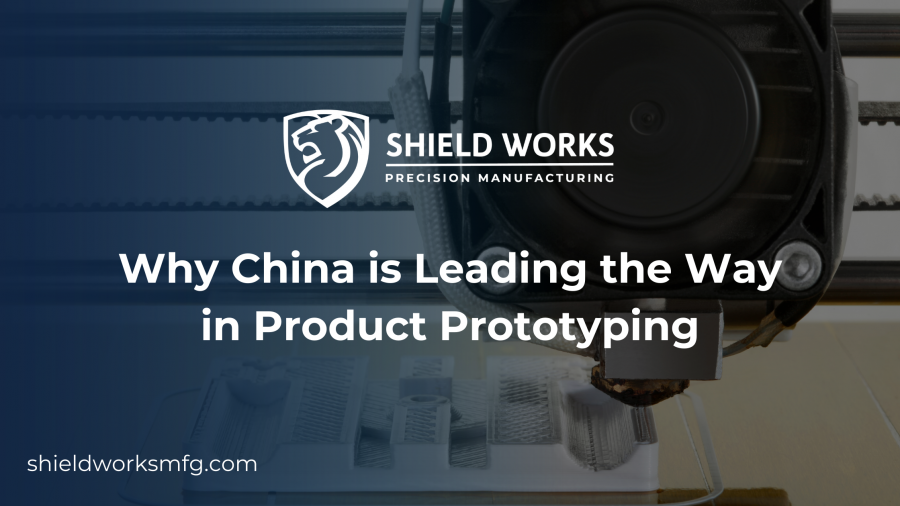
It’s no secret that China has become the dominant manufacturing force in the world, but many people still don’t realize how far this dominance reaches and what it can mean for your business. Product prototyping, for example, is something we take for granted in America, but China has taken it to a whole new level with their affordable and precise methods of product prototyping. With this knowledge, you can feel confident in your company’s ability to produce high-quality products at the speed of light by using Chinese product prototyping services.
Low-Cost Labor
While labor is not cheap in China, it’s still cheaper than similar manufacturing centers like Japan and South Korea. Using more advanced equipment and more efficient production processes, Chinese manufacturers are able to make their products faster, cheaper, and of higher quality than anywhere else on Earth. This allows them to price their services much lower than other countries. These efficiencies come from better use of technology (like robotics) and closer monitoring of labor schedules to minimize downtime (i.e., workers on breaks). The combination of these factors—lower costs from efficiency improvements plus lower wages—means that Chinese manufacturers can provide more products at a lower cost than anywhere else in the world.
One-Stop Shopping
You can get everything you need to prototype a product in one place. Many Chinese prototyping shops have engineers, graphic designers, 3D printers and injection molders on staff; once you sign up for a package deal, they’ll coordinate all aspects of your project from start to finish. This allows startup founders to do more with less. Even better: there are increasingly specialized prototyping companies that provide rapid manufacturing services for startups tackling a specific industry vertical.
For example, if you’re building a medical device, it makes sense to partner with a manufacturer that specializes in medical device design and manufacturing. These firms know exactly what’s required by regulatory agencies such as FDA so your team doesn’t have to worry about those details. Startups working on hardware projects should definitely consider partnering with these specialists early on in their development cycle.
Fast Delivery
Inexpensive prototyping and large-scale manufacturing allow product developers to innovate at an unprecedented pace. Chinese factories offer lower costs, shorter lead times, and larger production volumes than other countries. Companies like Apple have established relationships with Chinese manufacturers for over a decade. Today, nearly all of Apple’s products are manufactured in China—including final assembly for some parts (e.g., cables and batteries). While there are many factors that come into play when deciding where to locate production, high speed of prototype delivery has become increasingly important as consumers demand better turnaround times on pre-orders.
Preloaded Technology
Chinese manufacturers have preloaded their 3D printers with software to make them easier to use. They’ve also preloaded their engineers with more industry experience, as they tend to hire skilled workers who are versed in traditional manufacturing and creating similar products—or at least work with experts who are. Given the size of the population, the talent pool in China is nothing comparable to other countries. Such a huge gap can be difficult to close.
Culture of Innovation
The Chinese are traditionally known for copying or outright stealing Western technologies. But that’s all changing as China transitions into a technological powerhouse on its own right. Beijing’s top leaders have started to believe that innovation, not imitation, can help to solve some of their country’s problems and create new industries as well. They know that innovation can lead to economic growth and more jobs; over 700 universities across China have integrated innovation into their names, signifying an emphasis on education for research and development (R&D). Just a few years ago, these schools were focused on training engineers by rote—and churning out products manufactured elsewhere.
Local Tech Hubs
One reason why Chinese entrepreneurs are able to prototype at an impressive rate is because many Chinese startups utilize local tech hubs. These facilities allow a company to rent office space, equipment, and more – eliminating expensive overhead costs while also fostering a sense of community and support. Silicon Valley may have its perks, but when it comes to product prototyping, being closer to industry experts and resources might be just as important as proximity to large financial markets. For example, take Shenzhen’s Huaqiangbei Market for Electronics Components. This massive market features almost every kind of electronic component imaginable, from processors to motors and sensors to circuit boards. It’s like an entrepreneur’s paradise! There’s no need for a startup engineer or product designer to go through a distributor or manufacturer if they can just walk down Huaqiangbei Street instead! But there’s another benefit that makes Huaqiangbei so attractive: information sharing.
Shield Works has over 16 years of product prototyping in China and our n-house engineering team is both well-seasoned and bilingual. If interested, please feel free to contact us!
5 Qualities to Look for in a China Manufacturing Partner
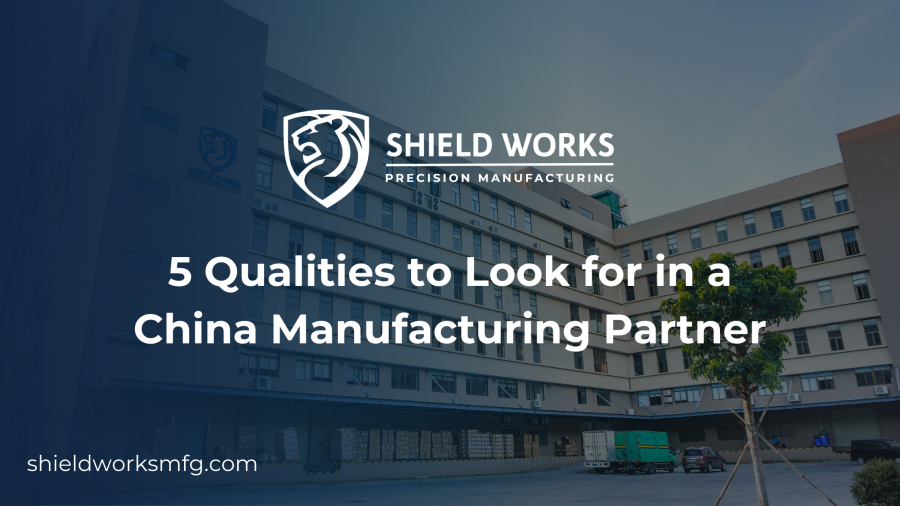
Finding the right manufacturing partner can be tricky, especially if you’re new to China manufacturing or just starting out with your business.
There are plenty of quality manufacturers out there, but it’s important to make sure that they have these 5 qualities before you enter into an agreement with them.
Only then will you know you can trust them and put your business in their hands without having to worry about things getting messed up along the way.
1) Knowledge
When you partner with a manufacturer, they’ll act as your vendor or factory.
This can be intimidating when you’re not sure what questions to ask or how much to spend.
A good China manufacturing partner will have knowledge of both manufacturing and international business and can help determine which factory or vendor is right for your product.
It’s important that your manufacturing partner understands what your product is, where it comes from and how it’s made—otherwise, how can he/she help you?
Skilled manufacturing partners are invaluable when it comes to navigating things like quality assurance, intellectual property protection and shipping logistics; manufacturers with specific knowledge will know exactly what questions you should be asking.
2) Transparency
If you have questions, or something goes wrong with your order, it’s nice to know that your manufacturer is open and honest about what happened.
It’s no good if you don’t get your calls returned or emails responded to quickly and thoroughly.
If you need a manufacturer who will constantly track and ensure they are producing quality products, make sure you ask around and do research before settling on one.
Chinese business culture can be complex and difficult for outsiders to navigate.
If you plan on doing business in Asia at some point, it’s a good idea to find someone who knows their way around and won’t hide how they do business from you.
3) Language
Communication is key with your new manufacturer.
Be sure you speak the same language.
If there’s a language barrier, it will make working together much more difficult and might lead to frustrations on both sides.
Make sure you clearly understand what your manufacturer will do—and won’t do—for you before signing any contracts or paying any fees.
You should be able to get an idea of their working style just by talking on Skype or even emailing back and forth for several weeks. (If they get upset easily when dealing with customers, it might not be worth continuing.)
If communication doesn’t go well at first, consider ending your relationship early rather than suffering through something that could eventually lead to problems down the road.
If you need much more timely response, you can also use WeChat, an IM chat app most Chinese use.
4) Dependability
Many manufacturers offer low-cost goods and services.
Although it might be tempting to use one of these companies, it’s important that you remember that you are paying for more than just products.
Quality customer service can be lacking from low-cost companies; you’ll want to work with an manufacturer who makes you feel comfortable and is always willing to answer questions.
This can help build a relationship of trust between your company and your manufacturer, which will be beneficial throughout your business venture.
On top of that, having direct access to someone at your manufacturer’s facility will make communication easier as you enter into negotiations
5) Personal Relationship
You might think that saving some money is good enough of a reason to choose a manufacturer solely based on price, but keep in mind that it’s much easier and more enjoyable to work with someone you already know.
You’ll get more out of your partnership if you feel like there’s trust and camaraderie on both sides.
Plus, buying in bulk will allow you to negotiate better prices than if you were working alone.
Your personal relationship should be one that allows communication channels open at all times.
This can also be a reflection of his/her relationship with suppliers.
In China, especially when it comes to dealing with factories, maintaining guanxi(relationship) is extra important.
It can make direct impact on how your order will be made.
Shield Works has over 16 years of manufacturing experience in China. Feel free to let us know if interested!
Can You Really Trust Product Development in China?
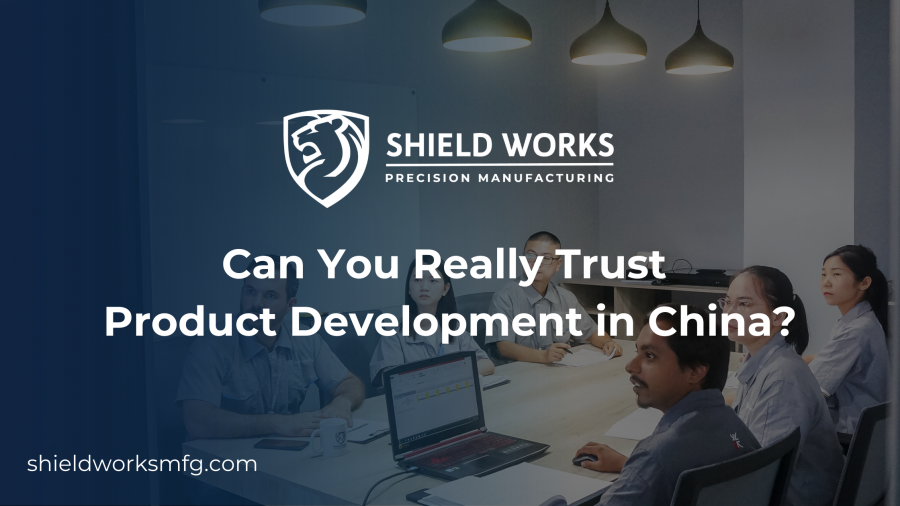
When you’re planning your next big product, where should you look to get it done? China or the United States? You might think that the answer to this question depends on your budget and how long you need the product to be in development, but that isn’t necessarily true. As it turns out, Chinese product development companies are capable of producing world-class products just as quickly as US companies and at a lower cost as well.
Is it a good idea to outsource product development in China?
Outsourcing product development to China may sound like an odd choice to many people. It’s not uncommon for engineers and product developers working on a project to assume that manufacturing abroad is only done when sourcing parts from other countries, but there are many advantages to having your new invention manufactured to China. For example, Chinese companies often provide their clients with ready-made factories, so you don’t have to worry about setting up a factory space before production begins. The best advantage of outsourcing product development, though, is cost savings; manufacturing costs are generally cheaper there than in Western countries, which makes it possible for startups to take risks they might not otherwise be able to afford.
After years of development, China is fully capable of developing quality products that can measure up to international standards. Many engineers and product developers think that outsourcing manufacturing to China is a risky decision because they believe that it would result in low-quality products. However, as more and more American brands begin using Chinese manufacturers for their projects, consumers are realizing just how reliable these companies can be.
Get it right from the start
The best way to avoid having quality problems later is to make sure that you are working with a partner who has great experience and impeccable standards from day one. Although there are myriad problems that can occur when making products abroad, you’ll want to make sure you have someone on your team that knows how to spot those issues before they snowball into disaster. Whether it’s something as simple as a minor translation error or as complex as a hardware issue, working with an experienced partner will help avoid major setbacks. Make sure you know what areas of your product and business could cause potential issues. No one can foresee everything. If you’re not certain about any aspect of your production process, do some research or consult with experts.
How long will it take to develop my idea and have samples made?
There are a number of steps involved in bringing an idea to life, from making some prototypes and testing them, to sourcing materials and having samples made. On average, it takes about six months from beginning to end. However, your product development timeline can be impacted by a number of factors (for example, if you choose to have your own custom mold created instead of using an existing mold). If you’re planning on manufacturing in China, there will also be shipping time factored into that equation. So how long does it take for samples to arrive? That depends on whether or not you’re going with standard shipping or DHL Express/UPS/FedEx delivery. With standard shipping, expect your sample shipment to take two weeks at most; with express delivery, expect one week at most.
But the pandemic is still here, and the world is more complicated than ever with everything going on. It is still subject to change.
How much should I pay for prototypes?
Even if you’re not ready to commit, getting prototypes made is often a good way to see what your product will look like (and feel like) and get a sense of its durability. It’s also worth considering that prototypes come with different price tags depending on their complexity. A simple injection-molded part may cost several hundred dollars and more, but full working samples can run into several thousand dollars. Get quotes from multiple suppliers and keep an eye out for low-cost prototyping options such as 3D printing; some firms even offer free printouts for first-time clients who bring them work.
How can I make sure you don’t rip me off?
It may seem scary to send money to someone you don’t know, but many clients work with their manufacturer to come up with an agreement before sending any payment. That contract should outline what will happen if there is a delay, how long it will take for delivery and what quality standards are expected. If you have concerns about your contract being followed, consider hiring a lawyer or working with someone who has experience making products in China. That way you can have peace of mind that nothing will go wrong and get exactly what you ordered.
There are definitely some reasons why you may or may not want to trust product development in China. But by investing time into finding a reputable partner and carefully researching them before handing over your project, you’ll be far less likely to have an issue. Shield Works has a history of 16 years in product development in China and certainly knows your language coming from the UK. Please contact us if you are interested in getting to know more!
